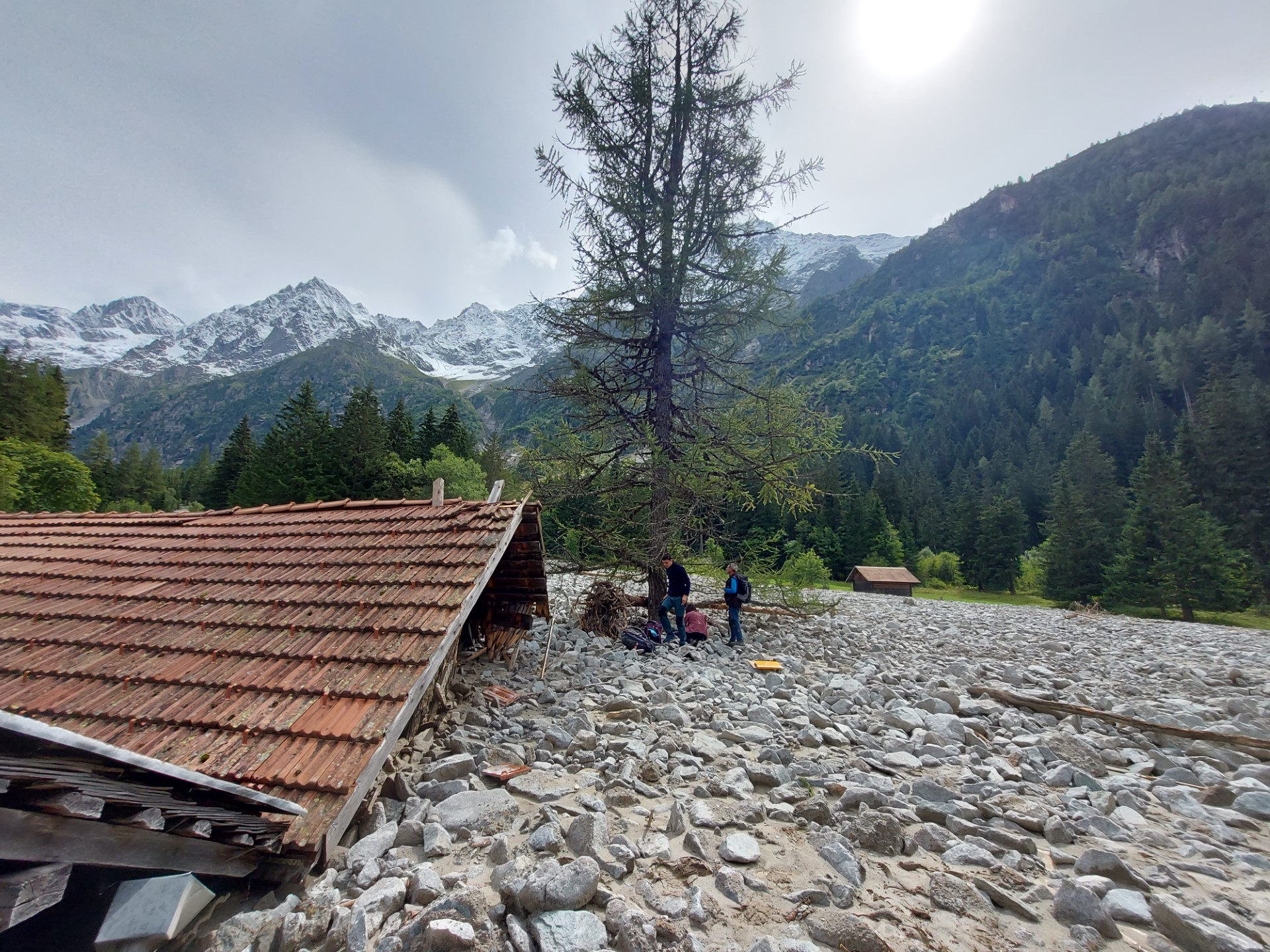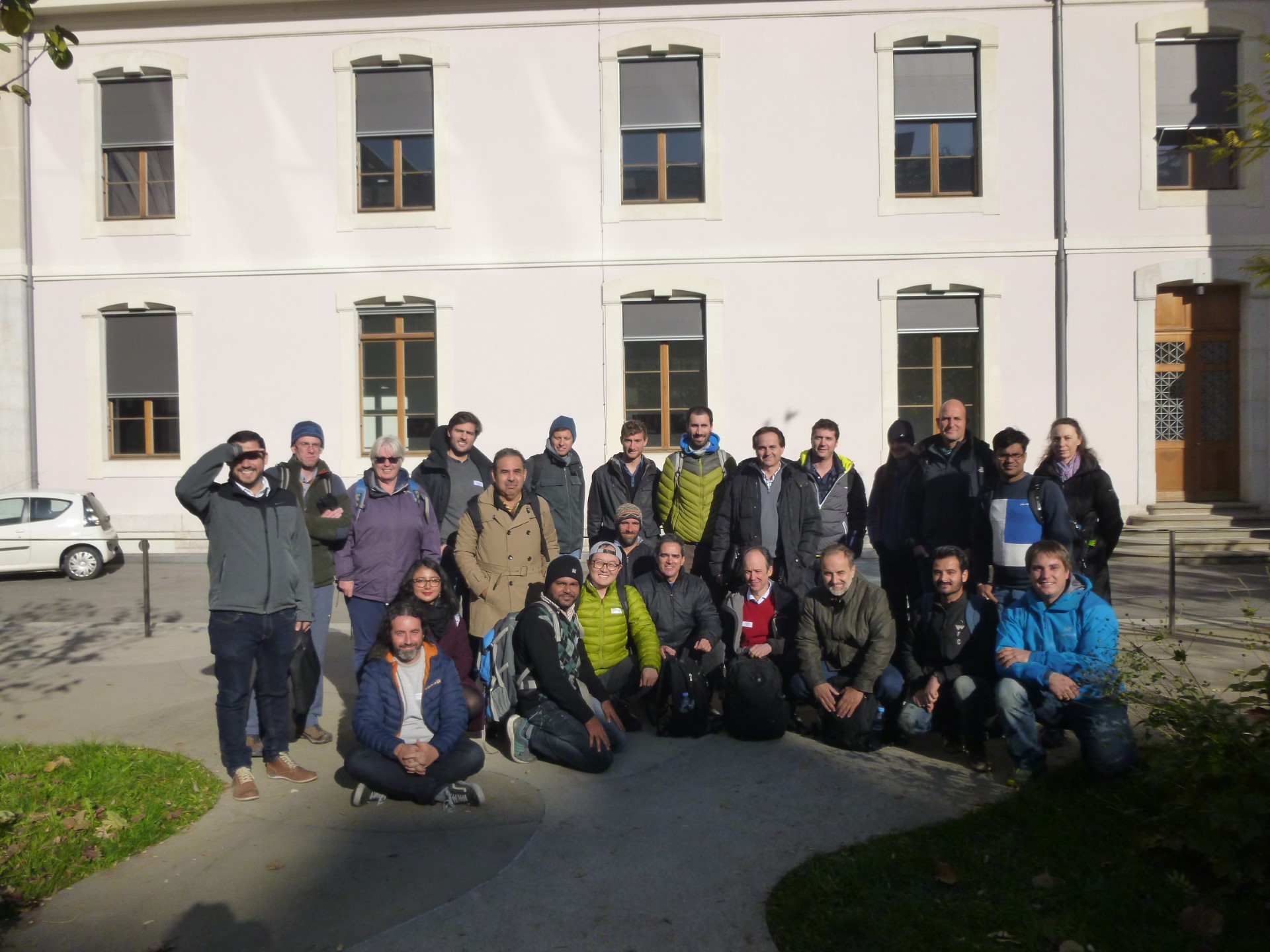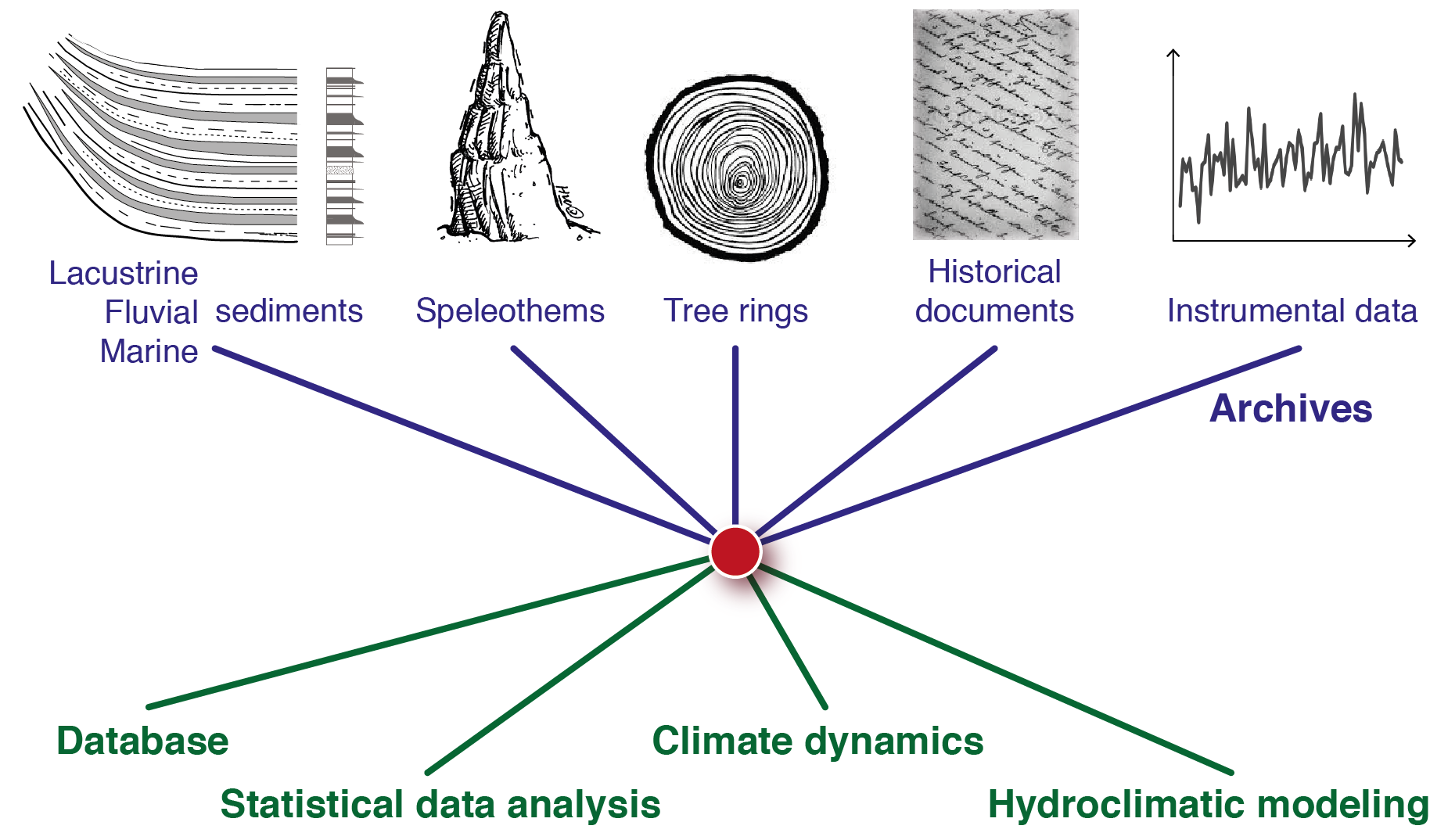- Home
- Science Introduction
- Wg
- Floods
- Floods Working Group
Floods Working Group

Phase 1 |
Phase 2 |
Phase 3 |
|
|
|
|
2015-2018 |
2019-2022 |
2024-2027 |

Summary
The Floods Working Group (FWG) aims to bring together all the scientific communities reconstructing past floods (historians, geologists, geographers, etc.) and those studying current and future floods (hydrologists, modelers, statisticians, etc.) to coordinate, synthesize and promote data and results on the natural variability of floods.
This group is open to anyone who is interested, and early-career researchers are encouraged to be involved:
- Subscribe to the Floods Working Group mailing list: https://listserv.unibe.ch/mailman/listinfo/floods.pages (Note: you must be signed in via the eduroam network to join the mailing list - read more about PAGES working group mailing lists here)
- Contact the leaders
Goals
- To intensify efforts to collect, standardize and disseminate the collaborative Flood Database.
- To integrate pluri-archive flood time series and to share best practices of methodologies to statistically analyze paleoflood data.
- To improve engagement with stakeholders and policymakers.
- To reach these goals, the Working Group has been structured into three Work Packages.
Floods constitute the most significant natural hazard to societies across the globe. Population growth and unchecked development have led to floodplain encroachment. Forecast climate change will regionally intensify the threat posed by future floods to societies, with more people in harm's way.
From a global change perspective, past floods and spatio-temporal patterns are of particular interest because they can be linked to former climate patterns, a proxy for future climate predictions.
Millennial and centennial time series include the very rare extreme events, which are often considered by society as 'unprecedented'. By understanding their timing, magnitude and frequency in conjunction with prevailing climate regime and human activities, we can overcome our lack of information and disentangle the so-called “unknown unknowns”.
Temporal and spatial flood patterns and related climate patterns, as well as the reconstruction of flood propagation in river systems, are new foci of the third PAGES Floods WG initiative.
Another key issue is how, when and where floodplains, including wetlands and deltas, were profoundly transformed by land-use, land reclamation, hydraulic management, industrialization, mining, etc. providing evidence for the concept of Anthropocene. These foci are crucial for the provision of robust data sets and baseline information for future flood scenarios and impact.
Phase III (2024 - 2027)
> Download the minutes of the Floods WG Annual Meeting at the EGU24
> Download the presentation from the EGU24 Floods meeting
In Phase III of the Floods WG, former work packages (WP) have been restructured around three topics: metadata collection (WP1), data integration (WP2) and dissemination (WP3).
Work package 1 (Phase II) is now Metadata (Phase III)
Work package 2 (Phase II) is now Anthropo flood integration (Phase III)
Work package 3 (Phase II) is now Disaster Risk Reduction (DRR) (Phase III)
New work package (Phase III) is Map of Extreme Floods (MEF)
Timeline for phase III
1st year:
- New call for contribution for the Open-access flood metadata base. Strong engagement of the Asian flood community, as well as from South America, Australia, New Zealand and Africa.
- Paper compilation and review process of the Special Issue “Temporal and spatial flood patterns under the effect of global changes” in Global and Planetary Change.
- Progress and publication of the results of the second phase of the multi- archive paleoflood integration project in the Bernese Alps, Iberian Peninsula, Atlantic basin, Himalaya, New Zealand Alps.
- Using the global Floods WG flood metadata base, pilot studies will be conducted in test regions to investigate flood forcing from the preindustrial period to the Anthropocene.
- Engagement with local to national stakeholders throughout key related projects.
2nd year:
- Developing pilot studies to identify benefits of paleofloods in DRR, in particular in mountain environments (Swiss Alps, Ordesa-Monte Perdido National Park, Spanish Pyrenees).
- Publication of the VSI in Global and Planetary Change and state-of-the-art Editorial concerning integrative proxy- and archive-specific methods.
- Organization of flood topic sessions at the EGU 2024 about new insights in the historical role of land-uses in floodplains and their effect on flood frequency and evidences of the Anthropocene. FWG Annual meeting.
3rd year:
- Organization of a Flood Working group Meeting (in Prague - tbd) with a focus on:
i) cutting-edge methods and innovative techniques;
ii) statistical time-space analysis of the flood variability and propagation; and
iii) evidence for the historical floodplain development toward the Anthropocene.
- PAGES Floods WG Synthesis report. Provide results and define the strategy for the future.
- PAGES Special Volume Highlights advance multi-archive paleoflood reconstruction reflecting the efforts of the Floods Working Group.
Workshop participants 2019
 |
Phase II (2019-2022)
Flood impacts are increasing worldwide. This trend is expected to continue due to:
- an increase of exposed populations living on floodplains; and
- changes in the hydrological cycle and frequency of extreme events caused by global warming.
Robust flood and risk assessments are therefore crucial. In this context long time series enable us to learn from the past how to adapt future climate change and improve the resilience of exposed population worldwide.
Evidence-based approaches play an important role on defining reliable flood hazard scenarios; especially because model-based outcomes present so far a high degree of inconsistence and uncertainties of future projections.
Paleoflood records from riverine, lacustrine, and marine sediments, botanical, speleothems, and historical documents, analyzed with state-of-the-art statistical tools, can provide a more comprehensive understanding of the variability of past extreme flood events and substantially improve the reliability of future flood-risk predictions. All of these data can significantly enhance our understanding of the physical processes controlling the occurrence and magnitude of floods under varying past, present and near future climate states, as well as under varying human impact in the watersheds (e.g. Neolithic, Medieval Age, Modern Ages, Industrial Age).The activities of Phase 2 will continue to reinforce the exchange between researchers. The main activities to be performed in Phase 2 are based on the White paper co-generated between all FWG members. This White paper shows the collaborative philosophy of the FWG and deciphers the main milestones for the next three years.
Read the Floods Working Group White Paper here. (pdf, 390KB)
The recent occurrence of devastating floods worldwide has increased awareness about the natural variability and the climatic forcing of these extreme events; opening the question whether or not past records could be used as future analogues in a 1.5-2°C warmer world. FWG aims to contribute solid key-data of past floods i) to include low-frequency large flood events scenarios in flood hazard assessment (i.e. flood frequency analysis) and ii) to improve our knowledge to anticipate the impact of future extreme floods. This is highly relevant, especifically in regions of the world where exposed populations living in floodplains are significantly increasing year-by-year.
Activities
Activities during Phase 2 include:
Mid-2019: Meeting of key participants to discuss research questions, organization, and planning of the second phase. First contact to be held in Prague organized by Libor Elleder. Goal: This meeting will aim to produce regional syntheses on existing paleofloods records as well as to co-define key milestones and deliverables for the second phase. This meeting will make a special effort to involve ECRs.
Mid-2020: Second online Work Packages meeting to continue methodological discussions, with the goal to track the achievement of the defined goals. Goal: Show and discuss recent advances in the field.
Mid-2021: Third workshop with a focus to move from methodological aspects to practical issues on human impact on flooding. Goal: Provide final results and define the strategy for the future; show and discuss recent advances in the field.
Phase I (2015-2018)
During Phase 1, the Floods Working Group (FWG) worked to gather the expertise of geologists, geographers, hydrologists, historians, modelers and statisticians to better understand the flood variability and impacts worldwide. FWG created a network of more than 100 researchers worldwide. Thus, the FWG has functioned as an excellence platform to promote collaboration among the researchers from different disciplines and to foster scientific progresses, and especially to help the young research generation connect with with senior researchers.
FWG reached the defined goals (see report), and has been structured around three Work Packages (WP1, WP2, WP3) that constitute the identified main topics.
2018 annual meeting update
The Floods Working Group held their annual meeting on 11 April during the EGU in Vienna, Austria.
Access the meeting minutes here. (pdf, 60KB)
Access the meeting presentation here. (pdf, 3.7MB)
Access the Work Packages presentation here. (pdf, 1.8MB)

Learn more and participate
This group is open to anyone who is interested, and early-career researchers are encouraged to be involved:
- To subscribe to the Floods Working Group mailing list and be involved in the group's activities, please email the mailing list administrators: https://listserv.unibe.ch/mailman/listinfo/floods.pages
- Contact the leaders
Coordinators
Leaders (and mailing list administrators)
Juan Antonio Ballesteros Canovas
(University of Geneva, Switzerland)
Lothar Schulte
(University of Barcelona, Spain)
PAGES Early-Career Network (ECN) representative
Juan Carlos Peña, Spain
Data liaison officer
Michael Kahle, Germany
PAGES SSC liaison
Boris Vannière (CNRS - Université de Franche-Comté, France)
Scientific committee
Scott St. George, USA: Data management, tree rings
Markus Stoffel, Switzerland: Tree rings
Rhawn Denniston, USA: Speleothems
Blas Valero-Garcés, Spain: Lake Sediments
Achim Brauer, Germany: Varves, lake sediments
Gerardo Benito, Spain: Fluvial sediments
Mark G. Macklin, UK: Fluvial sediments
Neil Macdonald, UK: Historical archives
Manfred Mudelsee, Germany: Statistical data analysis, data management
Database project
Main coordinators: Michael Kahle & Pierre Francus
Sub-group coordinators:
Historical archives: Neil Macdonald, Oliver Wetter & David Pino
Tree rings: Scott St George
Fluvial sediments: Willem Toonen, Samuel Munoz & Tao Liu
Lake/fjord sediments: Pierre Sabatier, Pablo Corella & Markus Czymzik
Speleothems: Rhawn Denniston & Marc Lütscher
Profiles of Floods Working Group members
Please find basic scientific profiles of Floods Working Group members here (.xlsx).
Members who would like to add their details to this list should contact Vincent Pellerito: vpellerito gmail.com (vpellerito[at]gmail[dot]com)
gmail.com (vpellerito[at]gmail[dot]com)